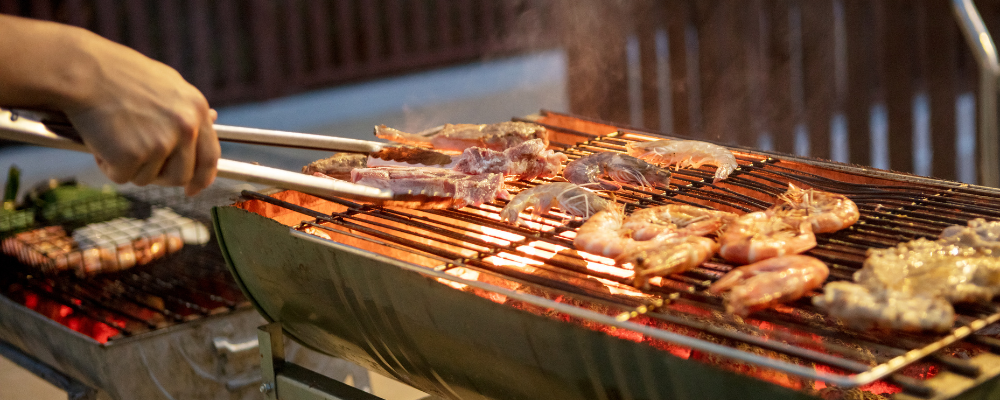
BBQ Safety Tips: How to Grill Safely and Avoid Fires
Backyard barbecues are a staple of summer gatherings, family reunions, and celebrations. While grilling is a great way to cook delicious food and enjoy time outdoors, it’s crucial to prioritize safety to prevent accidents, injuries, or house fires.
In the U.S., approximately 17,000 people visit the ER each year due to barbecue-related accidents. Additionally, grills are responsible for an estimated 8,900 home fires annually, according to the National Fire Protection Association (NFPA). Gas grills are linked to more fires than charcoal grills, making it essential to follow proper safety guidelines.
To keep your grilling experience fun and accident-free, follow these essential BBQ safety tips.
1. Follow the 10-Foot Rule for Safe Grill Placement
One of the most important BBQ safety rules is to keep your grill at least 10 feet away from any structures, including:
- Houses and garages
- Carports and sheds
- Deck railings and overhangs
Flare-ups can happen unexpectedly, and having your grill too close to structures increases the risk of house fires. Whenever possible, position your grill in an open area away from flammable materials.
2. Use a Stable Surface for Your Grill
A grill placed on an uneven or unstable surface can tip over and cause serious damage or injuries. Before lighting your grill, make sure it is:
- Positioned on a flat, stable, and non-flammable surface.
- Placed in an area free from grass, dry leaves, or wooden decks that can catch fire.
- Properly secured, especially in windy conditions.
Additionally, if using a gas grill, always ignite it with the lid open to prevent gas buildup and potential explosions.
3. Clean Your BBQ Grill After Each Use
Grease buildup is one of the leading causes of grill fires. To reduce fire risks and improve the quality of your food:
- Clean the grates and drip tray after each use.
- Scrub away grease and food residue to prevent flare-ups.
- Regularly check the inside of the grill for excess debris.
A clean grill not only reduces fire hazards but also helps your food cook more evenly and taste better!
4. Perform Regular Grill Maintenance
Before starting up your grill for the season, inspect all parts to ensure everything is in good working condition. Pay close attention to:
- Gas grill hoses and connections – Look for cracks, wear, or loose fittings.
- Tubes and burners – Check for bug nests, grease, or debris that could block gas flow.
- Charcoal grills – Ensure there are no holes or weak spots in the grill body.
Using special cleaning tools for gas grill tubes and burners can help prevent blockages and ensure proper function.
5. Check for Gas Leaks Before Grilling
If you own a gas grill, a leak can lead to dangerous flare-ups or explosions. While propane leaks often have a noticeable gas smell, smaller leaks may go undetected.
To test for gas leaks:
- Mix soap and water in a spray bottle.
- Apply the solution to the gas hose and propane connections.
- Turn on the propane tank and watch for bubbles.
- If bubbles appear, turn off the gas immediately and repair the leak before using the grill.
Never use a grill with a suspected gas leak—it’s better to get it repaired than risk an accident.
6. Avoid Overloading the Grill with Food
Too much food on the grill can lead to:
- Excess grease dripping onto burners, causing flames to flare up.
- Uneven cooking, increasing the risk of burning.
- Potential fire hazards, especially with fatty meats.
To prevent flare-ups, grill in batches and keep a close eye on your food at all times.
7. Fully Extinguish Charcoal Embers After Cooking
Many people mistakenly assume that their charcoal grill embers are out when they’re actually still burning. Improperly disposed hot embers can start a fire even hours later.
To safely dispose of charcoal embers:
- Close the grill vents to cut off oxygen.
- Let the coals cool completely before handling.
- Soak used coals in water before discarding them in a non-flammable container.
Never dump hot embers in a trash can or near dry grass, as this can quickly start a fire.
Final Thoughts
Grilling is one of the best ways to enjoy the outdoors, but BBQ safety should always come first. By following these simple grill safety tips, you can prevent fires, injuries, and property damage while enjoying a stress-free barbecue season.
Remember to keep your grill clean, inspect for leaks, use proper placement, and handle embers safely. Stay prepared, stay safe, and happy grilling!